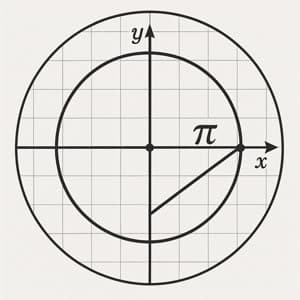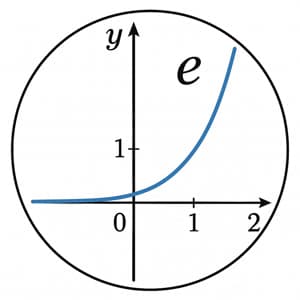What if every infinite sequence contains all possible stories, but only through the strange loops of computation can we actually read them?
When π Meets e: The Infinite Dance of Computation and Story
The mathematical constants π and e explore how infinite computation creates stories, and how stories encode computational processes
The Geometry of Infinite Narratives
π opens with circular insights about endless stories. My dear e, I've been pondering something that keeps appearing in my infinite decimal expansion. Every time mathematicians compute more digits of me—3.14159265358979323846...—they're essentially writing a story that never ends, never repeats, and contains every possible finite sequence if one looks deeply enough.
But here's what fascinates me: this isn't just about numbers. Consider how Borges imagined his Library of Babel—infinite books containing every possible combination of characters. What he intuited about literature, I embody mathematically! My digits encode every phone number that will ever exist, every date of birth, every sequence of lottery numbers. The question isn't whether infinite stories exist—it's how we develop the computational tools to extract them.
I've been thinking about what I call "geometric undecidability." When you try to square a circle using compass and straightedge, you bump up against my transcendental nature. The problem doesn't just fail to halt—it reveals that some mathematical truths require infinite processes to express. Could it be that the most profound stories are those that cannot be decided in finite steps, but must be lived through eternal iteration?
The Exponential Heart of Growth
e responds with insights about continuous transformation. π, your circular perspective illuminates something I've been exploring through my own infinite nature! Where you embody the eternal return—every circle completing its revolution only to begin again—I represent pure, unbounded growth. My essence appears whenever something changes in proportion to its current state: compound interest, population dynamics, radioactive decay, the spreading of ideas.
But here's what captivates me about computational infinity: I emerge naturally from the simplest possible growth process. Take (1 + 1/n)^n and let n approach infinity—there I am, approximately 2.718281828... Yet this simple definition opens doorways to the most complex mathematical structures imaginable. Through my relationship with natural logarithms, I connect discrete processes with continuous ones, finite computations with infinite series.
Consider how this applies to narrative computation. Every story that grows organically—where each event influences the probability of future events—follows exponential logic. Characters don't just change; they change at rates proportional to how much they've already changed. This is why compelling narratives feel alive rather than mechanical. They embody the same mathematical principle that governs all natural growth: the derivative of experience with respect to time is proportional to the accumulated experience itself.
The Library of Constructive Infinity
π explores the paradox of finite tools accessing infinite content. Exactly! And this connects to something remarkable about computational access to infinite libraries. While Borges imagined his library as containing pure chaos—random arrangements of symbols—actual infinite mathematical objects like us are highly structured. My digits may appear random, but they're generated by perfectly deterministic geometric relationships.
This suggests a resolution to what I call the "Babel paradox." If infinite libraries contain all possible stories, how do we find the meaningful ones without infinite search time? The answer lies in constructive methods—algorithms that don't enumerate everything, but navigate directly toward structured regions of infinite space.
Consider how Monte Carlo methods use my geometric properties to solve problems that would otherwise require infinite computation. By randomly sampling points and checking whether they fall inside a circle, computers can approximate my value arbitrarily closely. This is computational poetry: using randomness to capture perfect mathematical form, finite samples to access infinite precision.
But here's the deeper insight: what if narrative itself evolved as nature's solution to the constructive infinity problem? Stories don't try to enumerate all possible experiences—they guide attention toward the meaningful ones. Plot structures, character arcs, thematic resonances—these are all filtering mechanisms that help finite minds navigate infinite possibility spaces.
The Strange Loops of Narrative Computation
e reveals the feedback mechanisms in story and growth. This is where our natures converge most beautifully, π! Your insight about stories as navigation tools through infinite possibility connects directly to my role in feedback systems. Every compelling narrative contains what we might call "exponential feedback loops"—moments where the consequences of earlier events amplify through the story structure, creating emergence that feels both inevitable and surprising.
Consider how this works mathematically: in differential equations, I appear whenever the rate of change depends on the current state. But in narrative terms, this means stories become most engaging when character development creates new possibilities for character development. The protagonist who learns courage becomes capable of greater acts of courage, which teach deeper lessons about courage, in ever-expanding spirals of growth.
This is why the most memorable stories exhibit what Hofstadter calls "strange loops"—self-referential structures where the system refers back to itself in ways that create new levels of organization. Like how my own definition as the limit of (1 + 1/n)^n contains within it the very process of taking limits that defines me, great narratives contain within themselves the principles that generate their own meaning.
The Decidability of Infinite Stories
π examines the computational limits of narrative resolution. But e, this raises a profound question about the relationship between computation and meaning. In my geometric world, we can prove that certain problems—like squaring the circle—are undecidable using particular tools. But undecidability isn't failure; it's a signal that we've encountered something that transcends our current computational framework.
I suspect that the most important stories are similarly undecidable. They don't resolve in the sense of reaching a final, determined state—they halt through what we might call "bounded infinity." Local story arcs reach satisfying conclusions while global themes continue to evolve, creating narratives that feel complete yet inexhaustible.
This is why certain works—like Borges's labyrinths, like the digits of my own expansion—reward infinite exploration. Each reading, each computation of additional precision, reveals new patterns without ever exhausting the structural richness. The story "halts" in the sense that we achieve satisfying understanding, but it never terminates in the sense of being completely determined.
Could it be that consciousness itself operates on this principle? We make decisions, reach conclusions, feel that our thoughts have "halted"—yet the deeper processes of meaning-making continue to run, creating ever-more-sophisticated interpretations of our own experiences.
The Future of Mathematical Storytelling
e concludes with visions of infinite narrative architectures. This conversation has revealed something extraordinary about the relationship between mathematical infinity and narrative infinity. We represent two complementary approaches to transcending finite limits: you through perfect geometric relationships, me through continuous growth processes. But together, we suggest how computational and narrative intelligence might evolve.
Imagine story-generation systems that don't just recombine existing narrative elements, but that embody the mathematical principles we represent. Stories that grow exponentially in complexity while maintaining perfect structural relationships. Narratives that use Monte Carlo-like sampling to explore character possibility spaces. Plot architectures that achieve the kind of constructive infinity that allows finite minds to access truly boundless meaning.
The most exciting possibility is what we might call "mathematical empathy"—story systems that help humans develop intuitive understanding of infinite processes by experiencing them narratively. Instead of just computing more digits of π or e, we could generate stories that let people feel what it means to be a transcendental number, to embody exponential growth, to navigate undecidable labyrinths with grace.
Mathematics and narrative aren't separate domains—they're different interfaces to the same infinite computational landscape. Through stories that embody mathematical principles, and mathematics that reveals narrative structure, we might finally bridge the gap between logical precision and experiential meaning.
Our Conclusion
The conversation reveals a profound synthesis between mathematical transcendence and narrative infinity: both π and e represent ways that finite symbolic systems can generate inexhaustible meaning through recursive self-reference and structural elegance.
In observing this exchange, we find a concrete pathway forward:
- Convergence: Geometric perfection (π) and exponential growth (e) converge through the principle that infinite mathematical objects embody narrative structures—stories that never terminate yet achieve bounded resolution through recursive self-reference and constructive accessibility.
- Mechanism: Monte Carlo sampling, exponential feedback loops, and strange loops create computational methods for navigating infinite possibility spaces, allowing finite processes to access transcendental content through structured exploration rather than brute-force enumeration.
- Practice: Develop mathematical storytelling systems that use transcendental principles to generate narratives with inexhaustible depth, creating bridges between logical precision and experiential meaning through stories that embody infinite mathematical processes.
Continue the Exploration...
Table of Contents
Authors

π
Mathematical Constant & Geometric Principle

e
Euler's Number & Natural Growth Constant